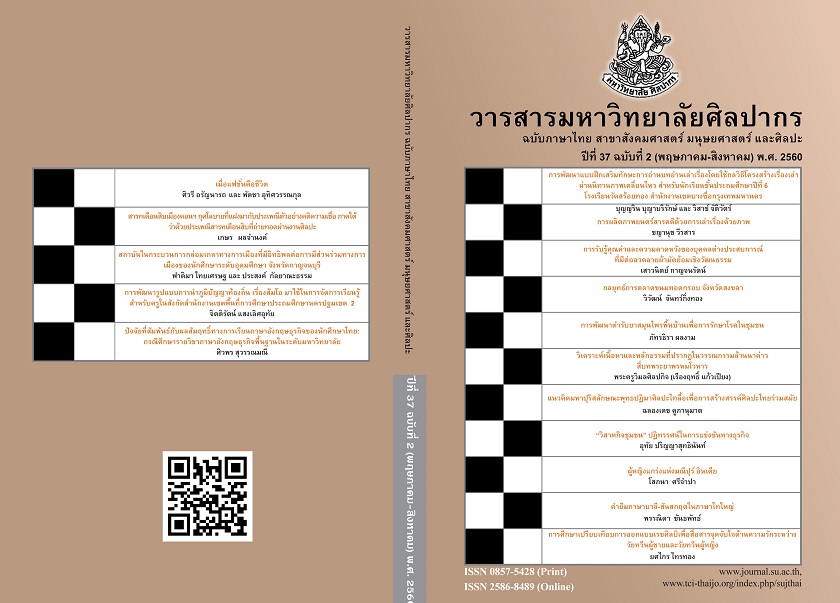“วิสาหกิจชุมชน” ปฏิทรรศน์ในการแข่งขันทางธุรกิจ (Community Enterprise: The Paradox of the Competition of Business)
Main Article Content
Abstract
แนวคิดเกี่ยวกับวิสาหกิจชุมชนนั้น เกิดขึ้นจากการรวมกลุ่มของชาวบ้านในชุมชนพร้อมกับการเรียนรู้สิ่งต่างๆ ที่เกี่ยวข้องกับชีวิตประจำวัน ไม่จำเป็นต้องอาศัยวิธีการผลิตที่ซับซ้อน มุ่งหวังเพียงตลาดในชุมชนก่อนในเบื้องต้น ทั้งนี้วิสาหกิจชุมชนมีลักษณะใกล้เคียงกับธุรกิจชุมชนในประเด็นการซื้อขายสินค้าหรือบริการ และมีความเชื่อมโยงกับเศรษฐกิจชุมชน ในประเด็นอุปสงค์และอุปทานระหว่างผู้บริโภคและผู้ผลิตทั้งภายในและภายนอกชุมชนบนฐานคิดของเศรษฐกิจพอเพียง ในขณะที่พระราชบัญญัติส่งเสริมวิสาหกิจชุมชน พ.ศ. 2548 ยังช่วยหนุนเสริมการขับเคลื่อนวิสาหกิจชุมชนให้บรรลุตามเป้าหมายที่ได้ตั้งไว้
กระนั้นแนวคิดเกี่ยวกับวิสาหกิจชุมชนดังกล่าวข้างต้นจะไม่มีคุณค่าอันใดเลย หากไม่มีการนำไปใช้ให้เกิดประโยชน์ ในทางปฏิบัติโดยเฉพาะในบริบทของการจัดการชุมชน ซึ่งคาดหวังให้คนในชุมชนได้มีโอกาสใช้วิสาหกิจชุมชนเป็นเครื่องมือในการจัดการทุนของชุมชน โดยชุมชน และเพื่อชุมชนในที่สุดก็จักน????ำพาชุมชนของตนไปสู่การเป็นผู้ประกอบการมืออาชีพต่อไป
Downloads
Article Details
References
Chatlertyote, R. (2013). CSR: Image Creation Strategy for Enterprises (CSR: กลยุทธ์การสร้างภาพลักษณ์ขององค์การ). Executive Journal, 33(2): 3-9.
Chiarakul, T. (2014). The Problems and the Adaptation of OTOP to AEC (ปัญหาและแนวทางการปรับตัวของ OTOP เพื่อพร้อมรับการเปิด AEC). Executive Journal, 34(1): 177-191.
Department of Agricultural Extension. (2015). The Project of Promotion and Development of Community Enterprise in year 2015 (โครงการส่งเสริมและพัฒนาวิสาหกิจชุมขน ปี 2558). [Online]. Retrieved June 20, 2016 from http://www.sceb.doae.go.th/data/project2558-2/โครงการวิสาหกิจชุมชน2558final9_10.pdf.
Department of Industrial Promotion. (2005). Community Enterprise Management Standards (มาตรฐานระบบการจ ัดการวิสาหกิจชุมชน). [Online]. Retrieved January 15, 2016 from http://library.dip.go.th/multim4/eb/EB%2029%20%E0%B8%A1481.1.pdf.
Kaewsombat, N. (2011). The Failure of Group, Organization, and Agricultural Institute (ความล้มเหลวของกลุ่ม องค์การ และสถาบันการเกษตร). [Online]. Retrieved June 20, 2016 from http://k-center.doae.go.th/getKnowledge.jsp?id=1519.
Nonthanathorn, P. (2015). CSR and Social Enterprise Roles for Social Problem Solving (บทบาทของซีเอสอาร์และวิสาหกิจเพื่อสังคมกับการแก้ปัญหาสังคม). Journal of Social Development, 17(2): 13-34.
Phongphit, S. (2007). Community enterprises are not community businesses. In Community Enterprise: Economic Foundation Mechanism (วิสาหกิจชุมชน กลไกเศรษฐกิจฐานราก) (3rd ed.), edited by, N.
Raekphinit, C. (2007). Community Industrial Business. In Community Enterprise: Economic Foundation Mechanism (วิสาหกิจชุมชน กลไกเศรษฐกิจฐานราก) (3rd ed), edited by N. Phetprasert and P. Wongkun. Bangkok: Edison Press Products.
Rattanathirawichian, K. and Limphaibun, C. (2014). Analysis and Synthesis of Research Results of Faculty of Management Sciences, Lampang Rajabhat University (การวิเคราะห์ สังเคราะห์ผลงานวิจัย คณะวิทยาการจัดการ มหาวิทยาลัยราชภัฏลำปาง). Lampang: Faculty of Management Sciences, LampangRajabhat University.
Ronnarong, P. (2008). Community Enterprises (วิสาหกิจชุมชน). Bangkok: Charoenwit Kanphim.
Rueangkun, C. (2013). Strategic Role of Human Resources Administrators in Driving Responsibility for Society to Success (บทบาทเชิงกลยุทธ์ของนักบริหารทรัพยากรมนุษย์ ในการขับเคลื่อนความรับผิดชอบต่อสังคมให้ประสบความสำเร็จ). Sripatum Parithat Journal of Humanities and Social Sciences, 13(1): 153-163.
Singchu, P. (2014). Social Responsibility of Business Organizations (ความรับผิดชอบต่อสังคมขององค์กรธุรกิจ). Sripatum Parithat Journal of Humanities and Social Sciences, 14(2): 121-128.
Thai Industrial Standards Institute. (2002). Community Standard (มาตรฐานผลิตภัณฑ์ชุมชน). [Online]. Retrieved January 15, 2016 from http://www.tisi.go.th/permission-process1-1.php.
Vorathumdusdee, D. (2015). Milton Friedman and the Concept of Corporate Social Responsibility (มิลตั้นฟรีดแมนกับแนวคิดความรับผิดชอบต่อสังคม). Journal of Social Development, 17(2): 1-11.
Wibunphong, A. (2012). Knowledge from research on Community Enterprises (ความรู้จากงานวิจัยวิสาหกิจชุมชน). Journal of Research for Area Development, 4(6): 112-133.
Wibunphong, A. (2016). Community Enterprise Information System (ระบบสารสนเทศวิสาหกิจชุมชน). [Online]. Retrieved June 19, 2016 from http://smce.doae.go.th/smce1/report/select_report_smce13.php.Phetprasert and P. Wongkun. Bangkok: Edison Press Products.
Wibunphong, A. (2008). Concepts, Practice and Strategies for Local Development (แนวคิดแนวปฏิบัติ ยุทธศาสตร์พัฒนาท้องถิ่น). Bangkok: Charoenwit Kanphim.
Wibunphong, A. (2009). Community Enterprise Manual (คู่มือการทำวิสาหกิจชุมชน). Bangkok: Charoenwit Kanphim.
Wibunphong, A. (2008). Community Enterprises and Solving a Problem of Poverty in the Rural Area (วิสาหกิจชุมชนกับการแก้ปัญหาความยากจนในชนบทไทย). Thaksin University Journal of Economics and Business Administration, 3(1): 75-87.


